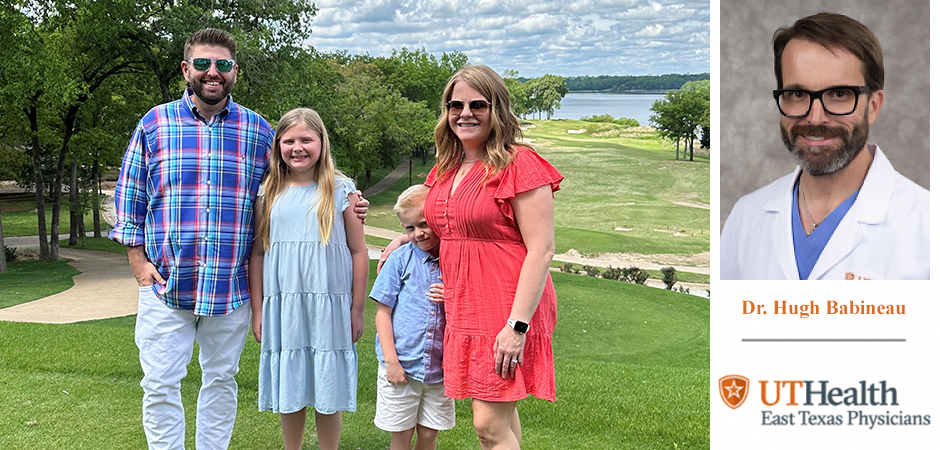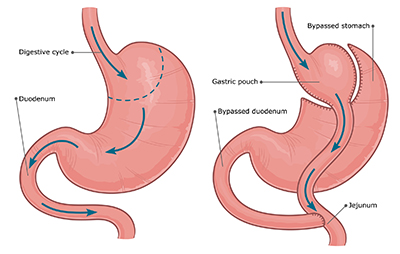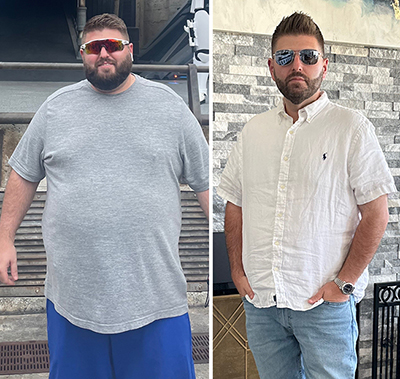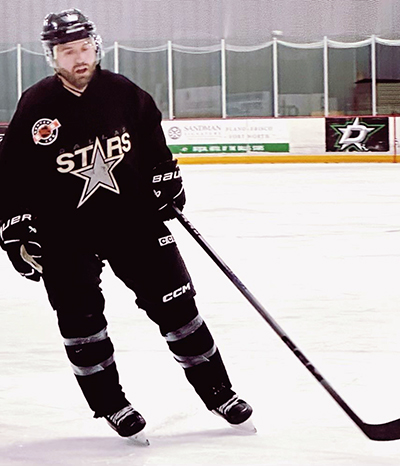
For Mike White, a 39-year-old salesman from Lindale, Texas, losing 127 pounds wasn’t exclusively the result of the excellent care he received at UT Health Tyler Bariatric Center. Much of his weight loss was also due to the new mindset he developed about food.
“Everyone can temporarily lose weight by having bariatric surgery,” said Mike. “But changing how you think about food can help keep the weight off for the rest of your life.”
As he grew up, Mike said he carried some extra weight as a kid, despite being active. As an adult with his own business, however, it was more difficult to maintain a steady weight.
“I used food as short-term happiness,” Mike recalled, “and started packing on the pounds. When my wife, Nicole, got pregnant, I ate more and gained even more weight. By the time our second child came along, I weighed about 290 pounds. Still, I rationalized. ‘Okay, I’m a big dude, but I’m not limited by my weight.’”
With a new job that required travel, Mike kept gaining weight with fast food as an all-too-often option. “Next thing I knew, I realized how overweight I was. My lifestyle was horrible!”
It all came to a head one day when Mike, now weighing 322 pounds, went with his family to Universal Studios Florida in Orlando.
“I stood in a long line with my family for a rollercoaster ride,” Mike remembered. “When we finally got to the front of the line, I couldn’t fit into the seat because I was too big. Since I couldn’t ride, I had to take a humiliating ‘Walk of Shame’ back to the exit, passing everyone waiting in line.”
That event convinced Mike to learn more. He began researching his options, including bariatric surgery.

Gastric Bypass Surgery
Mike scheduled a visit at UT Health Tyler Bariatric Center to discuss surgery options with Dr. Hugh Babineau and the team. This meeting led to other meetings with staff members to understand the keys to living a healthy life after surgery.
To prepare for the surgery, Mike went on a two-week liquid diet to lose some weight and ease into a new stomach configuration.
During the surgery, Dr. Babineau divided Mike’s stomach into two unequal parts. The top part, now called "the pouch," is about the size of an egg. The rest of the stomach becomes the “bypassed stomach," or "excluded stomach" because food and drinks no longer enter it. The bypassed stomach is not removed, since it still makes stomach enzymes and fluids.
Once the pouch has been created, food comes in at the top, leaves the pouch through a small opening called the “stoma," and travels into the intestines where digestion can take place. The fluids from the bypassed stomach, travel down a different part of the intestines and ultimately are mixed with the food. No part of the stomach or intestines is removed. This results in a smaller stomach that gets filled quicker, thus keeping individuals from eating as much as before.
After a successful surgery with no complications, Mike started his physical rehabilitation program, which included a new way to think about food.
New Food Mindset
After surgery, he restarted the liquid diet that helped him lose 20 pounds before the surgery.
“It takes a couple of weeks for your stomach to heal from the surgery, so you should not fill it with hard-to-digest food,” said Mike. “Eventually I got to the puree stage when I could eat somewhat solid foods, but everything had to be pureed like baby food. After that, you can start to introduce soft foods like scrambled eggs into your diet, but nothing too dense like meat.”
Mike explained that it’s a slow process to get acclimated to your new stomach. If you eat something that you shouldn’t, your stomach may start to reject the food and create what is commonly known as “the foamies,” a white mucous that comes up from your stomach.
 “It took me eight to nine months to get through the difficult stages, and it’s different for everyone. You don’t know what foods your body will tolerate until you try it. Now that I am a year post-surgery, I know what foods I can eat in moderation without side effects.”
“It took me eight to nine months to get through the difficult stages, and it’s different for everyone. You don’t know what foods your body will tolerate until you try it. Now that I am a year post-surgery, I know what foods I can eat in moderation without side effects.”
“In moderation,” was a big lesson for Mike to learn.
“For me, my food addiction was based on the quantities of food I ate,” he explained.
“Every time I ate, I got a feeling of pleasure – a short-term happiness. Chemically speaking, my brain was releasing dopamine into my cells, which made me feel good. I started to crave that feeling. However, the way addictions work, I needed to increase the amount of food I consumed just to get the same feeling, the same amount of dopamine, as before. It was an endless cycle that I needed to break out of.”
Before the surgery and afterward, Mike met often with dieticians, staff members and counselors to help him develop a new mindset about eating.
“The first step was realizing that I have a food addiction that will never go away,” said Mike. “I am always going to get a dopamine hit from tasting something really good, like a piece of cake. But before I get carried away and eat three pieces of cake, I have to turn to another activity that gives me the same amount of dopamine but is healthy to my body.”
For Mike, that alternative to eating was working out and getting physically fit.
“In my experience, the people who have the most success channel their need for dopamine into exercise, weightlifting and other physical activities. They get the same amount of dopamine but in a way that makes a positive impact on their lives, both physically and mentally.”
When a patient reaches the 90-day post-surgery mark, they are usually released to start doing physical activities.
“I did not jump into the physical activity right away and I wish I had,” said Mike. “I think I'd be further along towards my fitness goals than where I am. As I tell everyone, as soon as you're cleared for physical activity, jump on it, don't wait. You'll be happy you did.”
As for the staff at UT Health Tyler Bariatric Center, Mike was impressed with their professionalism.
“The staff is very confident and calm as they guide people through the process,” said Mike. “Their confidence put me at ease. I know that they’ve worked with hundreds of patients and know how to make this work, so I trusted them and followed their instructions.”
Looking Forward
 Now down to 195 pounds - five pounds away from his goal - Mike can enjoy playing hockey again in local pickup games.
Now down to 195 pounds - five pounds away from his goal - Mike can enjoy playing hockey again in local pickup games.
“After all I went through before and after the surgery, it’s now like being a different person. I have so much fun lacing up my skates with the guys. I grew up playing hockey and can now get back to it because it’s easy to do.”
In addition to hockey, Mike and his family expect to continue traveling a lot. For their upcoming anniversary, Mike and his wife will spend some time in New York City.
As for the rollercoaster ride that caused him a great deal of embarrassment, Mike is ready to try again.
“Nicole and I bought our family season passes to Six Flags over Texas, so now I can ride any of the rides that they want to ride. Let’s go!”
For more information about the services offered at UT Health Tyler Bariatric Center, call 903-593-0230 or visit tylerbariatrics.com.

